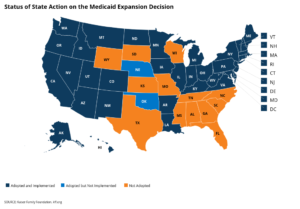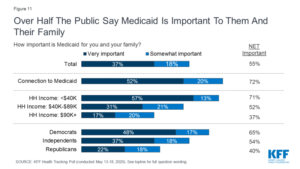“In the middle of a pandemic, Oklahomans stepped up and delivered life-saving care for nearly 200,000 of our neighbors, took action to keep our rural hospitals open, and brought our tax dollars home to protect jobs and boost our local economy.”
Amber England, manager for the Yes on 802 campaign to expand Medicaid in Oklahoma
Medicaid expansion is coming to Oklahoma, as voters there approved the measure on July 1st. The state has a year to put a plan in place, which will be written into Oklahoma’s constitution. This assures that those opposing the plan, including Republican governor Kevin Stitt, won’t be able to overturn the voters’ wishes.
Oklahoma is a deep-red state, having overwhelmingly voted for Donald Trump in 2016. But volunteers there collected a record number of signatures – 313,000 – to put the Medicaid expansion measure on the ballot in 2020. Idaho, Nebraska, and Utah, also notably red states, have already passed Medicaid expansion, and Missouri will vote on the measure in its August 4thPrimary.

What’s changing minds?
Opponents of Oklahoma’s Medicaid expansion were quick to point out that the measure passed by a slim margin – one percent – and that voters in urban areas accounted for the majority of yes votes. The build-up to the vote was fraught with mixed and confusing messaging from Governor Stitt, who initially advocated for a block grant Medicaid system before doing an about-face and vetoing his own plan in May. The opposition relied on this mix of competing plans, claims of unaffordability, and general opposition to government-sponsored health care to bolster their side.
It almost worked.
Oklahoma’s COVID-19 numbers have been rising, and in fact the state hit a record high of positive cases on the day of the vote. Those numbers continue to climb, with Governor Stitt becoming the first governor in the U.S. to test positive for COVID-19 on July 15th. Unemployment numbers are also on the rise, up to 14.7 percent according to U.S. Bureau of Labor Statistics (BLS) statistics. An estimated 50,000 Oklahomans have lost their employment-based healthcare coverage. Concerns about health care have became very real for many, causing some minds to change.
An estimated 50,000 Oklahomans have lost their employment-based healthcare coverage.
Christine McIntyre was a reluctant voter in favor of the expansion, but in the end she concluded this was about more than just herself. “I have mixed feelings about it. Part of me would vote ‘No,” but I have an adult son that makes borderline poverty that doesn’t qualify for Medicaid, and he doesn’t have health insurance, and because he doesn’t have health insurance, it affects his family, and upsets me. So I voted for it even though personally I probably wouldn’t have. I don’t know how I would say ‘no.’ ”

Here’s why Medicaid expansion makes sense – for everyone.
Medicaid expansion, as is the general topic of healthcare, is high on the list of voters’ issues. Oklahoma is the latest example. It’s been a long time in coming, but finally, the arguments used by those opposing public healthcare are starting to wear thin. In respect to Medicaid expansion specifically, here are some ways fiscal and health outcomes can and have improved.
State budgets need not suffer
Critics argue that state budgets can’t handle the burden of coming up with the 10 percent cost-share for its Medicaid expansion, but data from states that have already expanded Medicaid provides evidence to the contrary. Especially with COVID-19 causing extreme financial stress at the same time that there is increased demand for services, Medicaid expansion can shift costs off states.
For example, some health services previously paid for by state funds, such as mental health and substance use disorder, are covered by expanded federal Medicaid dollars. States can also save dollars by moving some of their existing Medicaid population into the expansion group, getting the higher 90 percent federal contribution toward the cost.
Montana, for example, provided coverage to an additional 100,000 people under its Medicaid expansion. Resulting savings in their state Medicaid budget more than offset their 10 percent contribution. States that did not participate in the expansion saw their Medicaid budgets balloon out of control – for example Mississippi saw a whopping 20 percent increase.
Medicaid can be a lifeline for rural hospitals already in crisis
Rural communities throughout the U.S. are suffering from hospital closures and doctor shortages. Oklahoma tied with Georgia in 2019 for having the third-highest number of hospital closures in the country. Increasing Medicaid and Medicare dollars in rural settings helps assure access to care for those with low-incomes. But it does more than that. Medicaid expansion helps to create a large enough insured population so rural facilities can remain open – something that’s important to those with private health insurance who live in remote areas. COVID-19 has added urgency to the rural health care crisis and expanding Medicaid can make a tangible difference.
Uncompensated care costs decreased under Medicaid expansion
When an individual seeks medical care but can’t afford to pay the bill, it’s called uncompensated care. Uncompensated care costs hurt all health care consumers – even those with “good” insurance – because those unpaid medical bills are eventually passed on in the form of higher insurance deductibles, copays, and other fees.
A University of Michigan study found that uncompensated care costs decreased on average 40 percent after Michigan’s Healthy MichiganMedicaid expansion program went into effect, and some hospitals experienced declines of as much as 57 percent.
Addressing costs by addressing chronic conditions
The Centers for Disease and Control and Prevention (CDC) indicates that 90 percent of the nation’s $3.5 trillion in annual health care expenditures are for chronic disease and mental health conditions. Medicaid expansion in Michigan helped enrollees, and by default, the state, get more “health for the buck” by getting primary care instead of using a hospital emergency room, said Dr. Susan Goold, who led a University of Michigan survey of Michigan doctors and nurse practitioners. Less expensive treatments, and more successful health outcomes are the win-win results when chronic conditions are addressed before reaching the point of emergency room care.
Healthier people create healthier economies
Undoubtedly, COVID-19 has thrown every type of economy – personal, business, and government – into a period of extreme uncertainty and stress. So it’s especially worth noting that a 2017 study of Michigan’s Medicaid expansion program found that broad economic gains flowed as a result of healthy people who were better able to work and spread those economic benefits throughout the economy.
While opponents of public health care will continue appealing to fear and misinformation, deep-red Oklahoma voters have shown that compassion and economic common sense are making headway. This provides hope that similar results lie ahead as voters continue to assess how the system is, and isn’t working for them.



